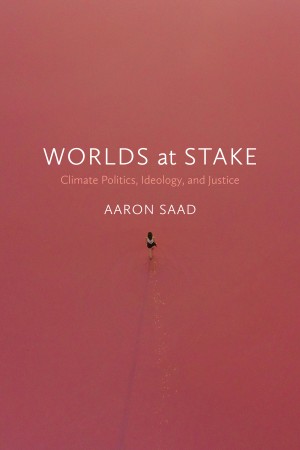T
he climate crisis has become a new reality the world can no longer ignore. For many, change is necessary. Aaron Saad draws attention to the simple slogan “System change, not climate change” often seen at climate marches. The nature and scope of change remains a persisting dispute, which often becomes an obstacle to finding a viable solution and taking action. Ideologies, or in other words, our perception of right and wrong, and consequently how the future should be shaped, have a profound effect on the kind of solutions we choose to impose.
In Worlds at Stake: Climate Politics, Ideology, and Justice, Saad intents to show readers the range of options on climate responses, familiarize readers with the landscape of climate politics necessary for critical evaluation of climate policies, and ignite the readers’ potential energy to contribute to collective political power by helping them find their place in the climate struggle.
Saad takes the reader on a critical journey by using an exploratory approach on differing ideologies and climate justice. By laying out the limits and reaches of each ideology comparatively, the book aids the reader in imagining the realities that the corresponding ideologies may lead to. Saad believes it is not enough to solve the climate problem with a certain response, but that we should also be choosing a response that in the process creates a desirable world.
The essential groundwork is laid in the first part of the book, where the author delves into the concepts of ideology and climate justice. Saad highlights the major role that ideology plays in climate politics, and provides an understanding of what ideologies are and how they work. The following two parts are split into categories of system-preserving and system-changing frameworks respectively, offering an insight into answering the question of whether it is an entire system change that is necessary.
Recommended
Could the existing dynamics in the system be utilized, tweaked, and refined to serve a better future? The second part of the book consists of the chapters “Neoliberalism and the World-Saving Market,” which discusses using the market forces of capitalism in bringing about change, and “Right-Wing Ideology and Climate Change Denialism”, and “Geoengineering,” which addresses using technology on a large scale to control the Earth’s natural systems.
Or, is it time for more radical changes that shake the system to the core? In the third part of the book, Saad discusses “Social Democracy and a Green New Deal, “Degrowth,” which is about the abandonment of a growth-centered economy to preserve ecosystems from human pressures, and “Ecosocialism,” or dismantling capitalism and designing an egalitarian society based on human needs, harmonized with ecology.
In the final part, Saad focuses on the climate movement, its recent tactics, and how they might change the world. Ultimately, Saad addresses incorporating ways of taking action into the discussion. Worlds at Stake offers a unique perspective and comes as a breath of fresh air to those who grasp the urgency of climate action but may feel unfamiliar with the topic or don’t quite know where they stand yet.
Aaron Saad, Worlds at Stake: Climate Politics, Ideology, and Justice (Fernwood Publishing, 2022) ISBN: 9781773635644, 192 pages

